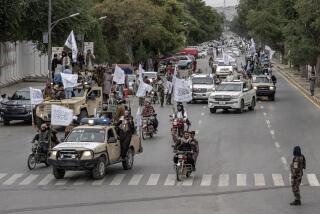Afghanistan: Take the Heat
- Share via
To those of us who regard diplomacy as a spectator sport, something like baseball except that the players don’t chew tobacco, the most irritating aspect of the game is its tendency to get side-tracked by irrelevancies. Remember the long debate over the shape of the negotiating table at the Vietnam peace talks in Paris? Well, something like that has bogged down the negotiations over the Soviet withdrawal from Afghanistan, just when success was tantalizingly close.
All parties even remotely connected to the six-year-old, U.N.-supervised Afghanistan talks in Geneva--the Soviet Union, the Soviet puppet government in Kabul, the moujahedeen rebels who have dealt the Soviet army its sharpest setbacks in decades, the United States and Pakistan--have agreed that the 115,000 Soviet troops should leave. A timetable for their departure has been adopted. Pakistan, which has harbored both the moujahedeen and more than 3 million Afghan refugees, stands willing to sign a pact of non-interference in Afghan affairs with the current government of Najibullah. Afghanistan would become a nonaligned state, a status to be guaranteed by both the Soviets and the Americans.
But now the signing of the agreement and the prospect of an orderly Soviet departure have been jeopardized by the Reagan Administration’s insistence that, as long as the Soviets supply arms to Najibullah, the United States will keep open its arms pipeline to the moujahedeen. The Administration, which introduced this condition at the last minute after agreeing for years to suspend arms deliveries when the Soviet withdrawal began, was responding to complaints from conservative Republicans; they argued that it would be shameful for the United States to leave the brave moujahedeen vulnerable to attacks from the retreating Soviet forces or from the Afghan army. In principle that sounds fine, but we’re concerned that the United States is squandering a chance for peace because of an unrealistic reading of the military situation in Afghanistan.
Press reports from there and from neighboring Pakistan say that the Afghan army is in disarray, with defection rates of up to 50%. The Soviets will leave behind huge amounts of weaponry, but even if they continue to cite old treaties with Afghanistan and keep pouring arms in to Najibullah, it is hard to imagine that his beleaguered army can stave off collapse for long. If the army, with the full Soviet military machine behind it, could not tame the moujahedeen in eight years, is it likely that such a goal can be achieved once the Soviets leave? And the moujahedeen , despite their internal squabbles, are hardly helpless; the United States has been shipping in $600 million worth of arms each year, and China has supplied like amounts. The resistance is already armed to the teeth.
So it seems odd that the United States is willing to pass up an agreement calling for a specified, orderly Soviet withdrawal for the sake of an arms guarantee that ultimately will make little difference to Afghanistan’s future.
All the ways that have been suggested in recent weeks to get out of this corner have their drawbacks. A side memorandum to the Afghan pact that would say that no matter what the United States promises formally about cutting off arms shipments to the rebels, it actually intends to keep that option alive would be an abomination; great powers do not sign treaties that they intend to violate. Soviet Foreign Minister Eduard A. Shevardnadze has made it clear that even if the Geneva talks collapse the Soviets will push ahead with their withdrawal. But a unilateral withdrawal would hardly be as desirable: The timing would suit only the Soviets, and they might leave behind some forces in northern Afghanistan in a buffer zone. The continuing civil war could spill over into Pakistan and make it difficult to repatriate the refugees there. And the United States would have lost an opportunity to demonstrate that the superpowers can resolve regional crises.
Given all that is at stake, the next U.S. play is clear to us: Sign the pact and take the heat from the conservatives.
More to Read
Sign up for Essential California
The most important California stories and recommendations in your inbox every morning.
You may occasionally receive promotional content from the Los Angeles Times.













